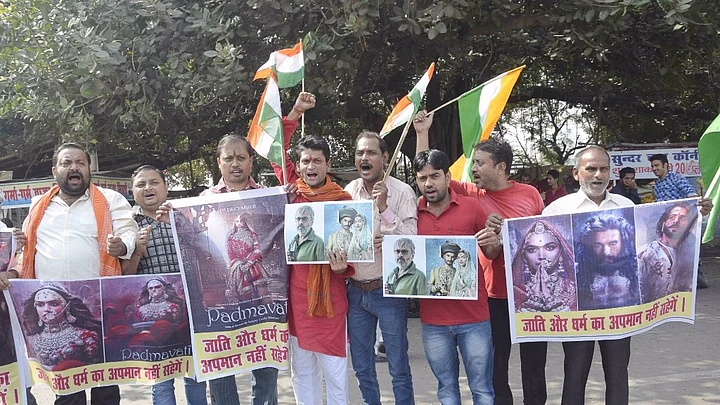In a significant victory for free speech, makers of the period film Padmavati have obtained successful orders both in the Gujarat High Court and the Supreme Court that rejected the petitions filed by self-appointed Rajput leaders. The petition was filed seeking an appointment of an expert committee consisting of historians and members of the Rajput community to screen the film before its release. It also sought a stay on the release of the film until the screening was done as prayed for.
Rani Padmavati, a queen whose historical existence is yet to be concretely established by historians, enjoys immense popularity as a legendary figure in the Rajput community. The queen survives in the group psychology of the community through the medium of folklores and oral histories, devices that are not given keen attention by formalistic historians.
The leaders of the community said they had apprehensions that the movie contained intimate scenes involving Padmavati and Khilji. There was also an objection raised as to a dance sequence in which the queen is said to participate.
Pertinently, in this era of post-truth, the battle of histories between the filmmaker and the leaders of the community has brought constitutional concerns to the fore. The chief issue involved in the instant imbroglio is that of pre-censorship.
While the Constitution guarantees freedom of speech and expression and frowns upon pre-censorship in the case of newspapers or the digital media, scrutiny of films is permitted under the Cinematograph Act 1952. As a result, pre-censorship is permissible in the case of audio-visual works so long as they are released in cinematographic halls.
This is a consequence of the Supreme Court’s decision in KA Abbas v Union of India, 1971 AIR 481.
Pre-censorship in India sustains on the back of the Central Board of Film Certification. What the petition by the Rajput community sought was to add another layer of scrutiny prior to the verification conducted by the CBFC.
The petition prayed the High Court to form a commission of members which include historians, Rajput leaders, writers and film-makers for full screening of the film and to remove historical facts and scenes that are found to be wrongly produced.
It urged the court to grant the reliefs by arguing in the interest of maintenance of public order, among other grounds.
The legal team, led by Abhishek Malhotra of Bharucha & Partners, effectively argued that the prayer sought by the petitioners was exactly what the CBFC was constituted for, viz, scrutiny and verification of films, and therefore the relief prayed for by the petitioners could not substitute the legal mandate of a statutorily legislated body.
Abhishek Malhotra was assisted by Angad Singh Dugal. Dr AM Singhvi and Amit Sibal appeared in the court on behalf of Sanjay Leela Bhansali.
Under the Cinematograph Act 1952, the Censor Board, at the first instance, is the empowered authority to grant certifications for public exhibition and distribution of films. In issuing certifications, the Censor Board relies on reasonable restrictions as provided under Article 19(2) of the Constitution and enshrined in Section 5(B) of the Act. Thus, the actions of the Censor Board are guided by constitutional flanks and cannot be whimsical or arbitrary.
Despite the favourable order received, the prospect of disruption of public peace and tranquillity at the hands of fringe elements against the release of the film remains a possibility. But that cannot be a reason for affecting or censoring the film in any manner on the basis of mere apprehensions or even vide an extra-statutory formulation such as the commission of historians, as prayed for in the petition. The Censor Board’s decision is issuing exhibition certificates in the case of movies
Tamas (Ramesh Singh v Union of India 1988 AIR 775) and Da Vinci Code (Sony Pictures v State of TN) has been treated by our courts to hold significant weight against any encroachment of the producer/director’s right of free speech and expression by special interest groups.
In the case of Tamas, which enjoyed a ‘U’ rating, the court affirmed the view that effect of the film must be judged from the standards of reasonable, strong-minded, firm and courageous men, and not those of weak and vacillating minds.
In the case of Da Vinci Code (“A”), an order was passed by the Commissioner of Police, Egmore, against the public exhibition of the film. The order was passed under Section 13(1) of the Cinematograph Act, which permits the local authority to pass an order for suspending the exhibition of the film on the ground of ‘breach of peace’. The Madras High Court held that before passing any such order, the local authority must have considered the effect of the certification granted by the Censor Board.
The court orders rejecting the petition in the case of Padmavati re-affirms the centrality of the Censor Board in determining the fitness of films for public exhibition, even as it prevented special interest groups from hijacking the process of film certification.
(The author is an advocate working with Arthe Law. This is an opinion piece and the views expressed above are the author’s own. The Quint neither endorses nor is responsible for the same.)
(#TalkingStalking: Have you ever been stalked? Share your experience with The Quint and inspire others to shatter the silence surrounding stalking. Send your stories to editor@thequint.com or WhatsApp @ +919999008335.)
